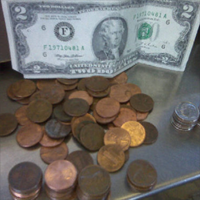I spent the five happiest years of my life in a morgue. As a forensic scientist in the Cleveland coroner’s office I analyzed gunshot residue on hands and clothing, hairs, fibers, paint, glass, DNA, blood and many other forms of trace evidence, as well as crime scenes. Now I'm a certified latent print examiner and CSI for a police department in Florida. I also write a series of forensic suspense novels, turning the day job into fiction. My books have been translated into six languages.
How much chemistry you need depends on what type of work you do. As long as you're not actually working in toxicology or DNA, you shouldn't need to be a great chemist as long as you can reliably work with chemicals and combine them properly (like following a recipe). And as long as you are a reliable and honest employee then the job is secure, once you get it, but I will be honest--there's a lot of competition in this field right now so getting into a position might be difficult. You should definitely have a back-up plan.
Someone trained in accident reconstruction might be able to do so, but not having marks on the road makes it more difficult.
"Unreliability of a science" is pretty a broad swipe, so I don't have any idea what you're referring to. Any line of work--government, plumbing, brain surgery--can be unreliable if the people doing the work are undertrained,overeager, arrogant or lazy.
Being 'on call' and knowing you can be interrupted at any moment of the day and have to go to a crime scene, even if it's the middle of the night or a holiday. I've also had to change vacations because I have to testify in a trial. I hate that.
Toll Collector
 What happens when a car blows past a tollbooth without paying?
What happens when a car blows past a tollbooth without paying?
Sommelier
 What's your favorite bottle of wine for under $20?
What's your favorite bottle of wine for under $20?
Call Center Employee (Retail)
 Which cable company do you think has the absolute worst customer service?
Which cable company do you think has the absolute worst customer service?
Take all the science courses you can, and visit and talk to forensic science personnel. You'll find them very approachable.
Yes. Unless I could make it as an architect. I would really like that too.
Plan to go to college and study biology, and try to find a college that has the specific major and courses you want.
-OR-
 Login with Facebook
Login with Facebook (max 20 characters - letters, numbers, and underscores only. Note that your username is private, and you have the option to choose an alias when asking questions or hosting a Q&A.)
(A valid e-mail address is required. Your e-mail will not be shared with anyone.)
(min 5 characters)
By checking this box, you acknowledge that you have read and agree to Jobstr.com’s Terms and Privacy Policy.
-OR-
 Register with Facebook
Register with Facebook(Don't worry: you'll be able to choose an alias when asking questions or hosting a Q&A.)